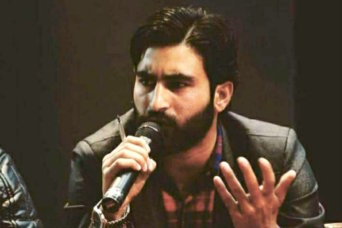- About
- Topics
- Story
- In-Depth
- Picks
- Opinion
- News
- Donate
- Signup for our newsletterOur Editors' Best Picks.Send
Read, Debate: Engage.
| located: | Pakistan, India |
|---|---|
| editor: | Shadi Khan Saif |
It might sound like a movie plot. A young man quitting higher studies at a reputed Indian university to join forces with the armed rebels, who are branded as ‘terrorists’ by the state and eventually dying at a young age.
But tragically this is how Manan Bashir Wani, who was pursuing his PhD in applied geology at Aligarh Muslim University in the Indian state of Uttar Pradesh will be remembered. The Kashmir valley, which is the bone of contention between nuclear-armed India and Pakistan, was in mourning over the killing of this PhD scholar-turned-militant in a pre-dawn encounter with the security forces in the Handwara area.
Wani’s killing called for soul-searching not only in Kashmir but also in New Delhi and Islamabad, where this lingering issue has to date been overlooked as if from the prism of strategic interests and as a matter of national pride, rather than the humanitarian crisis it is.
Clearly dismayed with the state of affairs in his native, naturally beautiful Kashmir valley, Wani announced he will be joining the armed rebels of the Hizbul Mujahideen, a group officially a terrorist organisation by the government. A photograph of Wani that surfaced on social media depicted the young man holding an under barrel grenade launcher with an accompanying message that declared he has joined the armed rebellion.
Kashmir has been burning for decades amid resurgent calls for rights and liberty. In the renewed spate of violence, particularly since 2008, the trend of turning towards an armed insurgency, especially among the educated youth, is evidently on the rise. It is clearly a verdict of failure on the engagements of the mainstream Indian parties, the local political movements and of course the international institutions that seem unable and unwilling to intervene to stop the bloodshed.
Prior to the killing of Manan, another young man, Burhan Wani (who was killed in a similar way) symbolised the rage and alienation resonating in Kashmir. Even after his killing in an encounter with the Indian security forces, Burhan became a folk hero in the valley. In the rest of India, however, the two are simply labelled as ‘militants’ with no soul-searching for identification of the reasons of their discontent with the status quo that took them on this deadly path. The state forces resorted to brazen force to clamp down on those protesting Burhan’s death two years ago, killing more than 40 people and injuring 1,800 more.
It is time for the world’s largest democracy – with its unwavering claims of ownership over Kashmir – to also love and own Kashmiris, especially its youths.
